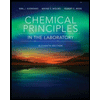Which statement below is not correct? O The standard hydrogen electrode has a reduction potential of zero (0) volts. O The tendency of a half-cell to gain electrons and proceed as a reduction is called the reduction potential for the half- reaction. O E° cell represents the standard cell potential, the maximum potential a cell can generate under standard conditions. O The measured cell potential for a spontaneous reaction can be positive or negative.
Which statement below is not correct? O The standard hydrogen electrode has a reduction potential of zero (0) volts. O The tendency of a half-cell to gain electrons and proceed as a reduction is called the reduction potential for the half- reaction. O E° cell represents the standard cell potential, the maximum potential a cell can generate under standard conditions. O The measured cell potential for a spontaneous reaction can be positive or negative.
Chemistry: The Molecular Science
5th Edition
ISBN:9781285199047
Author:John W. Moore, Conrad L. Stanitski
Publisher:John W. Moore, Conrad L. Stanitski
Chapter17: Electrochemistry And Its Applications
Section: Chapter Questions
Problem 92QRT
Related questions
Question

Transcribed Image Text:Which statement below is not correct?
O The standard hydrogen electrode has a reduction potential of zero (0) volts.
O The tendency of a half-cell to gain electrons and proceed as a reduction is called the reduction potential for the half-
reaction.
O E°
cell represents the standard cell potential, the maximum potential a cell can generate under standard conditions.
O The measured cell potential for a spontaneous reaction can be positive or negative.
Expert Solution
This question has been solved!
Explore an expertly crafted, step-by-step solution for a thorough understanding of key concepts.
This is a popular solution!
Trending now
This is a popular solution!
Step by step
Solved in 2 steps with 2 images

Knowledge Booster
Learn more about
Need a deep-dive on the concept behind this application? Look no further. Learn more about this topic, chemistry and related others by exploring similar questions and additional content below.Recommended textbooks for you

Chemistry: The Molecular Science
Chemistry
ISBN:
9781285199047
Author:
John W. Moore, Conrad L. Stanitski
Publisher:
Cengage Learning

Chemistry: Principles and Practice
Chemistry
ISBN:
9780534420123
Author:
Daniel L. Reger, Scott R. Goode, David W. Ball, Edward Mercer
Publisher:
Cengage Learning

Chemical Principles in the Laboratory
Chemistry
ISBN:
9781305264434
Author:
Emil Slowinski, Wayne C. Wolsey, Robert Rossi
Publisher:
Brooks Cole

Chemistry: The Molecular Science
Chemistry
ISBN:
9781285199047
Author:
John W. Moore, Conrad L. Stanitski
Publisher:
Cengage Learning

Chemistry: Principles and Practice
Chemistry
ISBN:
9780534420123
Author:
Daniel L. Reger, Scott R. Goode, David W. Ball, Edward Mercer
Publisher:
Cengage Learning

Chemical Principles in the Laboratory
Chemistry
ISBN:
9781305264434
Author:
Emil Slowinski, Wayne C. Wolsey, Robert Rossi
Publisher:
Brooks Cole

Principles of Modern Chemistry
Chemistry
ISBN:
9781305079113
Author:
David W. Oxtoby, H. Pat Gillis, Laurie J. Butler
Publisher:
Cengage Learning

Chemistry: Matter and Change
Chemistry
ISBN:
9780078746376
Author:
Dinah Zike, Laurel Dingrando, Nicholas Hainen, Cheryl Wistrom
Publisher:
Glencoe/McGraw-Hill School Pub Co

Chemistry: An Atoms First Approach
Chemistry
ISBN:
9781305079243
Author:
Steven S. Zumdahl, Susan A. Zumdahl
Publisher:
Cengage Learning